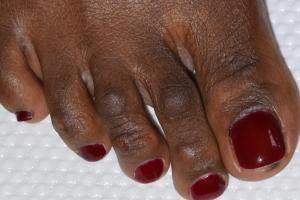Corns and calluses
Corns and calluses are areas of hard, thickened skin. They develop when the skin is exposed to a lot of pressure or friction. They commonly occur on the feet and can cause pain and discomfort. If you have them on your feet, see a podiatrist (chiropodist) for advice about treatment.
Corns
Corns are small circles of thick skin. They usually develop on the tops and sides of toes or on the sole of the foot - but they can occur anywhere.
Corns are often caused by:
- wearing shoes that are not a good fit – shoes that are too loose can allow your foot to slide and rub
- certain shoe designs that put too much pressure on an area of the foot – for example, high-heeled shoes can squeeze the toes

Corns often occur on bony feet as there's a lack of natural cushioning. They can also develop as a symptom of another foot problem, such as:
- a bunion – where the joint of the big toe sticks outwards as the big toe begins to point towards the other toes on the same foot
- hammer toe – where the toe is bent at the middle joint
Calluses
Calluses are hard, rough areas of skin that are often yellow. They can develop on the:
- feet – usually around the heel area or on the skin under the ball of the foot
- palms of the hands
- knuckles

Calluses are larger than corns. They don’t have such a well-defined edge.
As callused skin is thick, it's often less sensitive to touch than the surrounding skin.
Calluses develop when the skin rubs against something, such as a bone, a shoe or the ground. They often form over the ball of your foot. This is because this area takes most of your weight when you walk.
Activities that put repeated pressure on the foot, such as running or walking barefoot, can cause calluses to form. Athletes are particularly susceptible to them.
Other possible causes of calluses include:
- dry skin
- reduced fatty padding – older people have less fatty tissue in their skin
- regularly holding objects such as a hammer or racquet
Treating corns and calluses
If you have a corn on your foot, you should see a podiatrist, also known as a chiropodist, who can advise you about treatment.
If you have a condition such as diabetes, your GP may be able to refer you to a podiatrist employed by the health service, for help with foot care.
Treating corns
Corns on feet won't get better unless the cause of the pressure is removed.
A corn is a symptom of an underlying problem. You should only treat it yourself if you know the cause and you've spoken to a specialist about the best way to manage it.
Over-the-counter treatments for corns, such as corn plasters, are available from pharmacists.
Corn plasters may not be suitable for certain people, such as those with diabetes, circulation problems, or fragile skin.
Ask your pharmacist or podiatrist if you need advice about treating corns.
Treating calluses
As with corns, you should only treat calluses yourself after a podiatrist has identified the cause and advised you about treatment.
The podiatrist may be able to treat corns or badly callused areas using a sharp blade to remove the thickened area of skin. This is painless and should help reduce pain and discomfort.
They can also provide advice on self-care and prescribe special insoles.
Preventing corns and calluses
You can also help prevent corns and calluses by looking after your feet and choosing the right shoes to wear.
Follow the advice below to help stop any hard dry skin developing.
Dry your feet thoroughly after washing them and apply a special moisturising foot cream (not body lotion).
Use a pumice stone or foot file regularly to gently remove hard skin. If you use a pumice stone, make sure it dries completely between uses and doesn't harbour bacteria.
Wear comfortable footwear that fits properly. You should be able to move your toes inside the shoe with a small gap between the front of the shoe and your longest toe. If possible, avoid wearing heels as they increase the pressure on the front of your feet.
Don't put up with foot pain as if it's normal. Either see a podiatrist directly or go to your GP, who may refer you to a podiatrist. They'll be able to investigate the underlying cause of your foot pain.
More useful links
The information on this page has been adapted from original content from the NHS website.
For further information see terms and conditions.